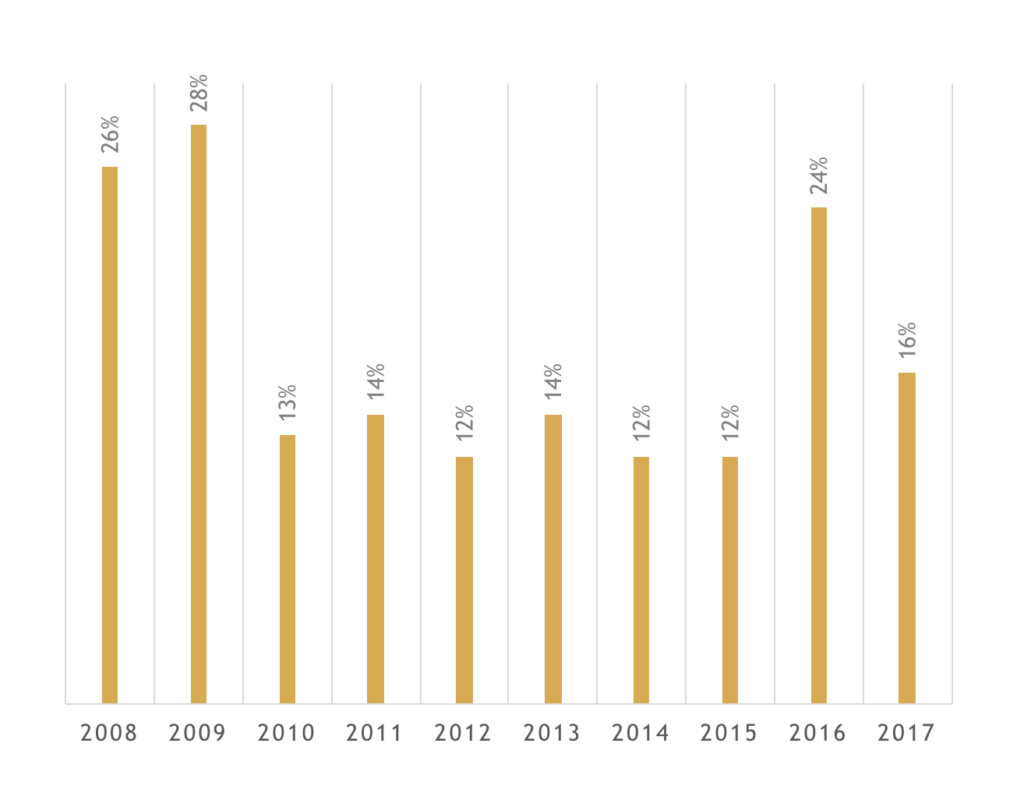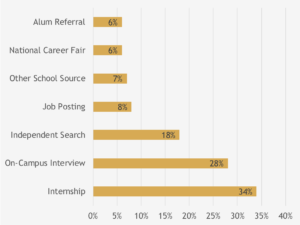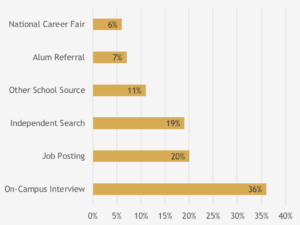By Kara Sherrer
Healthcare is the only industry that’s officially an MBA concentration at Vanderbilt Business, and for good reason: The healthcare environment in the United States is uniquely complex, and healthcare jobs expect a certain level of industry knowledge in potential employees. Not only that, healthcare also must contend with government regulation, in addition to the pressures of a regular business.

Burch Wood
“Things can change with a vote and be completely different within three months, so it’s important not to get stuck in one little piece of the industry,” said Burch Wood, Director of Healthcare Programs at Vanderbilt Business. “(You need) to understand how the whole thing works together.”
With that complex environment comes a variety of healthcare roles, both in terms of function and in terms of employers. We sat down with Wood as well as Amanda Fend, Director of MBA Recruiting, to find out what roles are available in healthcare now, where MBA students are taking jobs, if coming healthcare innovations will change what jobs are available, and how MBAs find internships and jobs in healthcare.
What Roles Are Available Now?

Amanda Fend
Since healthcare is an industry, MBA candidates can find jobs in healthcare in just about any traditional business function: consulting, finance, general management, HR, marketing, operations, and product management. “What’s great is that moving into healthcare post-MBA is not limited to students who have previous healthcare experience, because every functional area is represented and looking for MBA talent,” said Fend.
These functions are spread across three main categories of businesses: care delivery, consulting, and corporate. Care delivery providers come in many forms, including hospitals, outpatient care, home and long-term care, imaging, diagnostic labs, and renal care. Consultants may go to a boutique firm that specializes only in healthcare clients or accept an offer at a larger general management firm and try to get placed on healthcare projects; some also take on internal consulting roles within a single company.

Class of 2017 full-time offers by industry
Source: Vanderbilt MBA Employment Report 2017
The corporate side takes a variety of forms, from new startups to huge firms. Pharma, biotech, and healthcare technology companies are gaining ground in recent years, but students also find positions at payers and outsourcing/distribution businesses. Many MBAs are also interested in leadership development programs (LDP) at healthcare companies.
“Many students end up in healthcare because of a functional area or because they’re drawn to a Leadership Development Program, not necessarily because they set out to do healthcare,” Fend said. “They’re MBA students, so they’re drawn to challenges and solving problems, and it’s an industry that has a lot of problems that need to be solved.”
How Will Healthcare Jobs for MBAs Change?
Wood says that multiple shifts are happening in the healthcare industry right now. Hospitals are already beginning to consolidate and also trying to navigate post-acute care — and deciding whether that should even occur in a hospital, as opposed to at home. Many organizations are also trying to figure out how to confront the opioid epidemic, a trend that will only continue.
The demand for big data (and the analysis that goes along with it) is increasing as population health grows in awareness. Biotech and pharmaceutical companies are continuing to grow, and new startups keep popping up around telemedicine and blockchain technologies.
Despite these changing industry trends, Wood says that the roles available for MBAs will remain the same: finance, operations, marketing, etc. However, both he and Fend forecast that healthcare companies will look more and more to MBA graduates to run the business side, rather than relying on doctors or hospital administrators.

MBAs accepting healthcare jobs as a % of the graduating class
Source: Vanderbilt MBA Employment Reports, 2008-2017
Looking backward, over the past decade about 17% of Owen graduates accepted full-time offers in the healthcare industry directly after school. That average is far from insignificant, especially since it does not include graduates who accepted healthcare-related jobs at consulting firms, who are classified under the consulting industry. On top of that, Fend says she’s already seen an uptick in the past few years as more healthcare organizations look to hire MBAs, and Wood says this will only continue.
“As companies grow, they’re going to have to turn more towards business schools to run that piece, because no one else trains that piece. It’s what business schools do,” he said.
How Do MBAs Get Healthcare Jobs?

Source of healthcare full-time offers, 2012-2018
Source: Career Management Center
Looking at the Vanderbilt Business data, on-campus interviews were the most important resource for finding an internship in healthcare, followed closely by job postings and independent searches, which include student networking, internet job boards, and previous employers. About a third of students receive a full-time offer from their healthcare internship. For those who seek out other opportunities, on-campus interviews, independent search, and job postings remain important resources.
Whatever avenue students use to find an internship or job, demonstrating passion for and knowledge of healthcare is key for securing a position. While students can get a job in the industry without officially taking the healthcare concentration, because of the government regulation and other concerns, familiarity with the quirks of the healthcare industry helps immensely.
Fend says that when it comes to recruiting, students usually start with a broad focus and then narrow it down to something more specific, such as healthcare consulting or pharma companies, at which point they familiarize themselves with that specific part of the industry. “The sooner students realize ‘I want to be in healthcare, (so) where am I going to add value, what function and skill set do I want to focus on?’ the easier it will be for them,” she said.

Source of healthcare internship offers, 2012-2018
Source: Career Management Center
However, Wood says that the classes for the concentration itself deliberately give an overview of the entire healthcare industry. This broad overview makes it easier for students to identify which types of companies they may be interested in, and to switch between different parts of the industry — such as a jump from consulting to the provider side — later on their careers.
“Yes, we do focus on the industry, but what makes us a good healthcare program…is that we don’t overload with a particular piece of (healthcare) specific knowledge and this piece of the industry,” Wood said. “If you want to do healthcare, it’s worth taking the time to understand how it works, and that will give you a leg up when you do interviews.”
